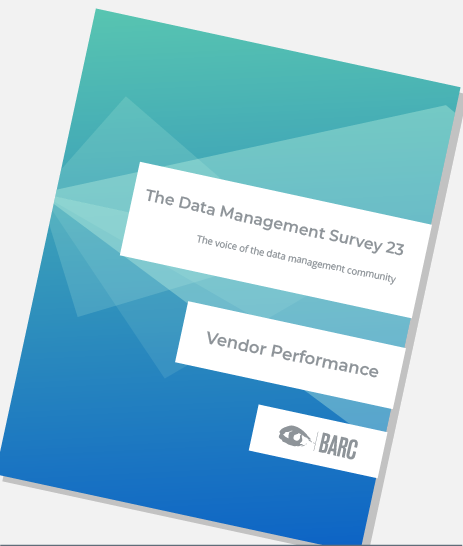Google BigQuery
Google is the flagship subsidiary of Alphabet Inc., one of the world’s largest technology conglomer-ates. While advertising remains its primary source of revenue, mainly through Google Search, Google Ads and YouTube, Google’s diverse product portfolio includes cloud services, hardware and numerous online platforms. The company is synonymous with data, boasting unmatched expertise and success in managing and monetizing data and in the research and development of methodologies and technolo-gy required to manage data at a truly enormous scale. Google is constantly expanding its global foot-print. It currently has over 174,000 employees, 148 offices, 24 data centers and 38 cloud regions around the world.
The Google Cloud Platform (GCP) serves as Google’s enterprise cloud solution, offering a broad range of services from infrastructure to machine learning. GCP, launched in 2008, builds upon the same ro-bust infrastructure and tools that support Google’s core products. While GCP ranks third behind Ama-zon AWS and Microsoft Azure in overall market share, its focus on data management, analytics, ma-chine learning and AI solutions has a growing reputation in the developer and data engineering com-munity.
Central to GCP’s data offerings is Google BigQuery, introduced in 2011. BigQuery is a platform as a service (PaaS) fully managed, serverless data warehouse and analytics environment. BigQuery is opti-mized for analyzing petabyte-scale data using SQL-like syntax. Additionally, the system trains, runs and manages machine learning (ML) models and data science workflows via BigQuery ML. BigQuery lever-ages a unique Google-developed query engine named Dremel. Dremel is a distributed column-based data management system for batch and interactive querying of very large datasets.
BigQuery is an important technology used extensively throughout Google for mission-critical applica-tions and services. The fact that the company relies heavily on the technology is an endorsement of its overall functionality and reliability. A great example is Google Ads, Google’s online advertising platform and main source of revenue ($224 billion in 2022). Google Ads users can easily access all their data through Google BigQuery in real time. Every click made by customers is instantly (with very low latency) available for analysis in Google BigQuery. These capabilities are essential for digital business and have become business-critical when used for fully automated real-time campaign management.
Google BigQuery and the entire Google Data Platform ecosystem are optimized for very large and demanding use cases. It is important to note that companies with fewer than 100 employees and less significant demands also leverage the solution. These firms make up 38 percent of the BigQuery users responding to this survey.
Direct integrations to end-user tools such as Tableau, Power BI, Qlik, Domo, SAS, ThoughtSpot and others (including Excel) are available. In addition, most modern data processing, analytics and AI tools support direct access to data from Google BigQuery, and APIs are provided for all major program-ming languages to build data-driven solutions. Google’s Cloud partner ecosystem covers every region of the world and numbers in the thousands.
Google continually improves and expands its cloud services offerings around data and AI. Under the umbrella brand Google Cloud Smart Analytics, Google is striving for seamless integration between its various components and towards becoming a holistic, universal and approachable platform for data, analytics and AI.
Google Cloud Smart Analytics is highly focused on AI/ML. The company has made several key executive hires in recent months to sharpen execution on AI/ML across its portfolio. The new BigQuery Studio further enhances the company’s commitment to making AI pervasive by supplying a single interface for data engineering, analytics and ML workloads to make working with data and activating AI easier and faster.
The Google Cloud Smart Analytics platform continues to grow and widen with its capabilities. Building out a complex enterprise data warehouse on Google BigQuery remains challenging compared to other platforms. Third-party tools are required for some traditional data warehouse functions. BigQuery is now available in three editions (Standard, Enterprise and Enterprise Plus) including BigQuery autoscal-ing, which dynamically adjusts capacity to meet demand and save money for clients. In 2022, over 100 new features were added across the platform.

User & Use Cases
BigQuery’s top-ranked use cases are data integration (ETL/ELT) at 71 percent, data discovery at 48 percent and data lakehouse (43 percent), illustrating the variety of ways users leverage the cloud-based data management and analytics capabilities of the solution. Google BigQuery itself is not a data lake solution, as it focuses on structured data in columnar storage formats for fast access and querying. However, in the overall Google Cloud Smart Analytics ecosystem, there are additional components such as Dataproc (Hadoop, Spark-based data processing), Dataflow pipelines plus new open lakehouse compatibility with Apache Iceberg, Delta Lake and Apache Hudi lakehouses launched in 2023.
Google BigQuery usage leans toward large enterprise companies with more than 2,500 employees, with 43 percent of our respondents coming from these firms. The balance of users is driven by small companies with fewer than 100 employees at 38 percent and medium-sized firms with 100-2,500 em-ployees at 19 percent. Cloud-based technology like BigQuery delivers value across all company and data sizes.
33 percent of our respondents are using Google BigQuery for advanced analytics and ML. Google has kept pace with AI innovation by delivering BigQuery ML, which now enables customers to bring GenAI to their data using Vertex Foundation models directly on their data in BigQuery. As mentioned above, the Google Cloud Smart Analytics portfolio is highly focused on ML/AI.
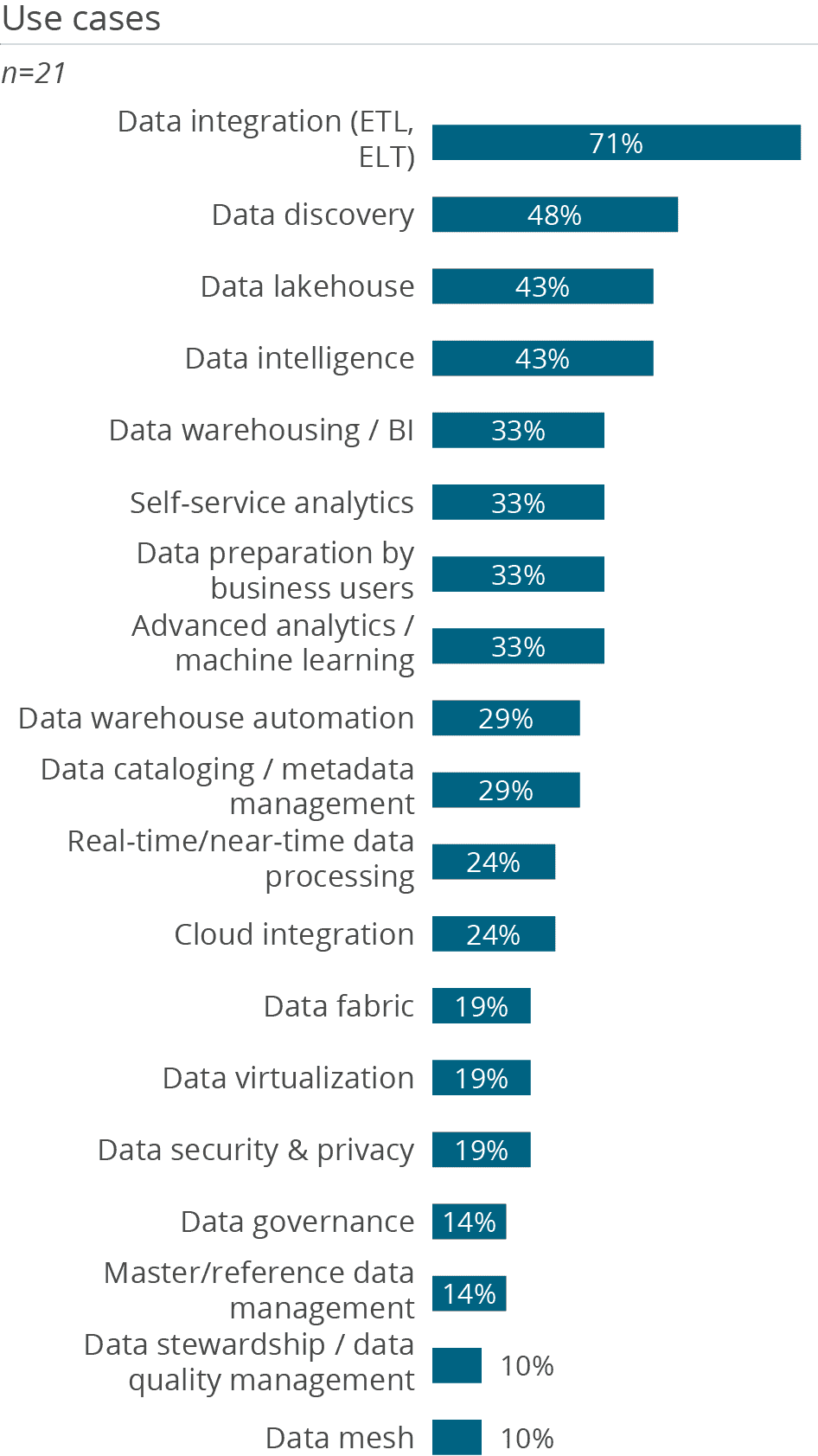

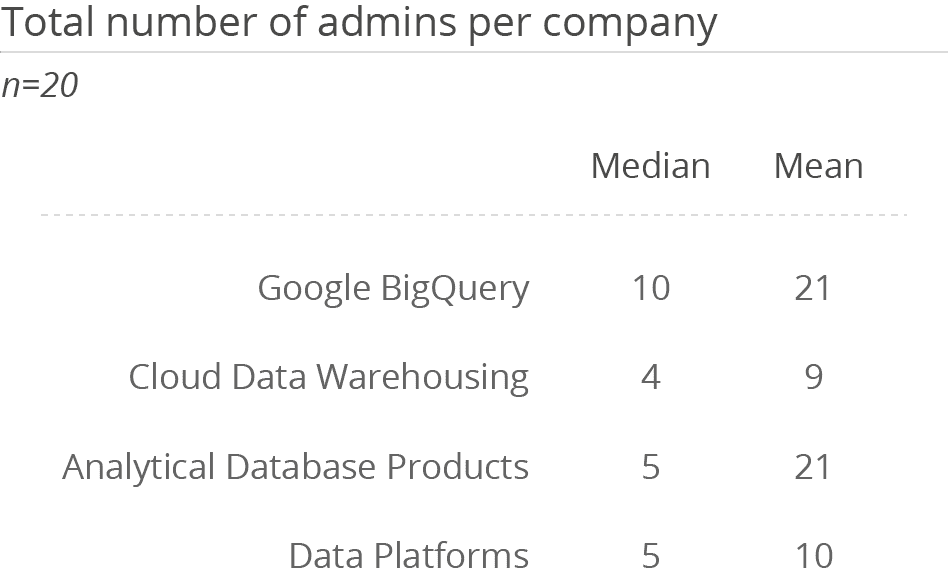
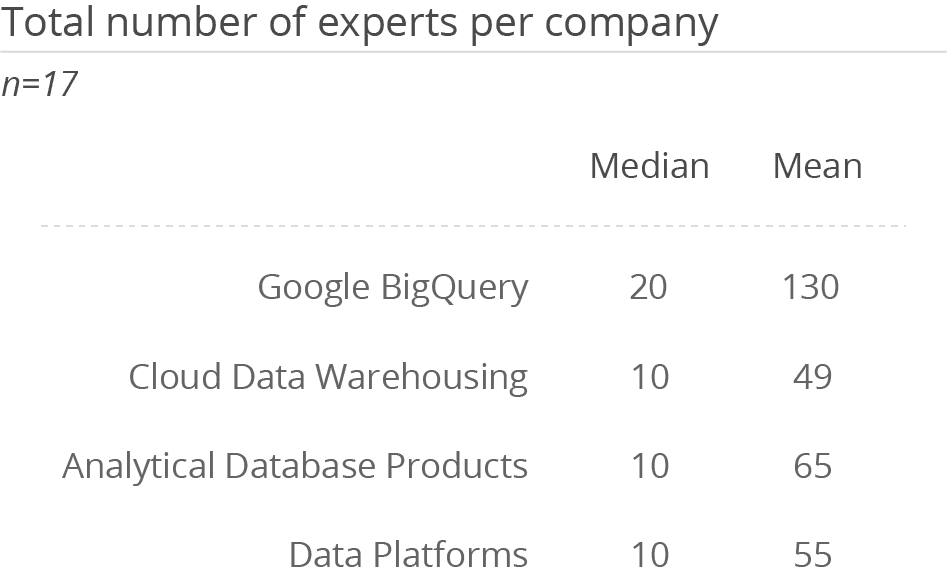
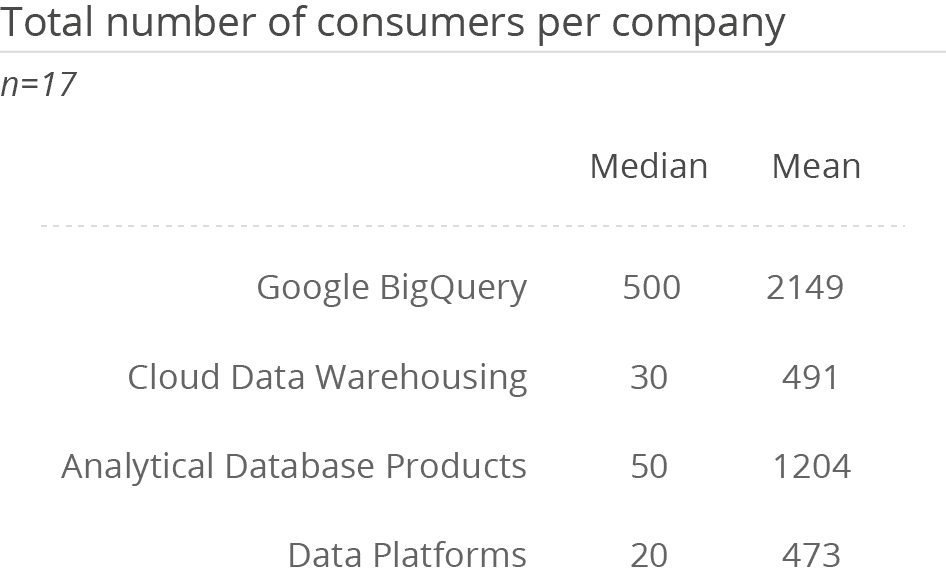
Want to see the whole picture?
BARC’s Vendor Performance Summary contains an overview of The Data Management Survey results based on feedback from Google BigQuery users, accompanied by expert analyst commentary.
Contact us to purchase the Vendor Performance Summary- Register for a free sample Vendor Performance Summary download
- If you have any questions, feel free to contact us
